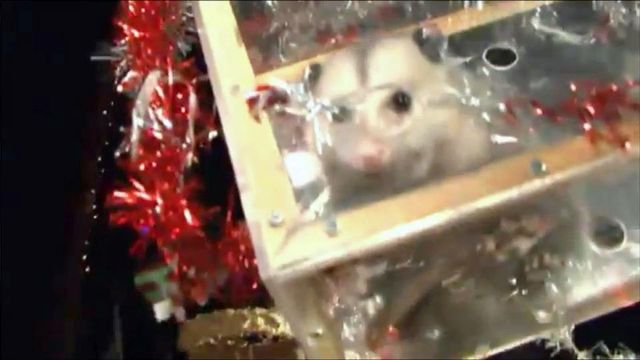Court ruling again threatens annual Possum Drop
With less than four weeks until New Year's Eve, the annual Possum Drop in a North Carolina mountain town is once again up in the air following a court ruling Friday.
Posted — UpdatedSuperior Court Judge Bryan Collins granted a preliminary injunction against a law the General Assembly passed in June that created a regulatory loophole for the Clay County business that holds the Possum Drop.
Clay Logan, a convenience store owner in the mountain community of Brasstown, created a New Year's Eve tradition for the town similar to the lowering of the crystal ball in New York's Time Square and the giant acorn in downtown Raleigh. Collins said Logan could still hold the Possum Drop on Dec. 31 if he gets a license from the state Wildlife Resources Commission under a 2013 law.
People for the Ethical Treatment of Animals has repeatedly challenged the event, which involves lowering an opossum in a Plexiglas box during the countdown to the new year, as cruel treatment of the nocturnal marsupial.
A judge two years ago ruled that the Wildlife Resources Commission didn't have the authority to grant a permit for the event, prompting lawmakers last year to pass the so-called "Possum Right to Work Act" that allows the commission to issue a permit for the Possum Drop as long as Logan meets certain humane requirements for trapping an opossum and keeping it in captivity.
PETA alleged that Logan left an opossum that appeared – but wasn't dropped – at the Dec. 31, 2013, event unprotected in freezing weather and didn't provide proper veterinary care for the animal, both of which violated his captivity license.
Shortly after the group sought to have Logan's license revoked this year, Rep. Roger West, R-Clay, introduced legislation that exempts Clay County from any state wildlife regulations regarding "the capture, captivity, treatment, or release" of possums for one week each year – Dec. 26 to Jan. 2.
The bill was introduced May 20 and passed the House and the Senate within two weeks.
PETA attorney Jon Sasser argued it went too far.
"Under that, it is perfectly legal to kill a mama possum nursing her babies on the courthouse steps in Clay County, and I can use my flamethrower to do it. I can behead a possum, waterboard it, crucify it, do anything at all that’s humanly possible with a possum during that week of the year," Sasser said. "That is a remarkable statute."
He argued that the 2014 law was written specifically to benefit Logan and was even made retroactive to immunize him against complaints that he violated the 2013 statute, which he said was also written at Logan's behest to protect his celebration.
"This person must be the most powerful person in North Carolina because he’s got himself two laws now," Sasser said. "It’s really fun to talk about, 'Well, this involves possums and that sort of thing,' but that is a scary law. If you can do that, you can make it legal to do anything you want to do and make it retroactive."
Assistant Attorney General Tamara Zmuda said the state is not required to regulate opossums, and PETA lacks the legal standing to force it to do so.
"They don’t have the right to protect the possum. They don’t own the possum. The state owns the possum," she argued. "Even though they want to protect the possum, they just don’t have a legal right to do it."
Even though Zmuda insisted the law did not remove all protections for opossums, Collins disagreed.
"I think that the intent of this law is clear and that the language of this law is clear and that they differ," Collins said, adding that he wasn't sure what the constitutional remedy for that might be.
"There might not be a constitutional provision that says, 'Thou shalt not pass a crazy law that doesn’t make sense,'" responded Sasser. "But that can certainly be a motivating factor."
Zmuda argued the law is not "crazy."
"You think it’s a bad law or a stupid law or a law that you don't like – that’s not what the courts are here for. So, I would say that that argument doesn’t have any weight," she said.
Zmuda urged the judge not to issue the injunction, saying the law is intended to serve a public purpose in preserving the economic benefit of the event, which she said brings some 3,000 people to Brasstown each New Year's Eve.
"If you can get 3,000 people to a possum drop," Sasser countered, "how many can you get for a dog fight? Or for gladiators fighting lions? The number of people you bring in by doing something doesn’t necessarily make it a public purpose."
Sasser argued the law is unconstitutional on several counts. First, he said, it violates the state constitution's limitations on local laws. Second, he argued it violates the emoluments clause, which prohibits legislation intended to benefit an individual. And third, he argued, it violates the equal protection clause, since wildlife handlers in other counties have to pay a fee to be licensed to keep possums in captivity, while Logan wouldn't have to.
Collins agreed that the animal-rights advocates would likely win the suit against the new legislation, so he granted the injunction to prevent it from taking effect on Dec. 26.
That means that the 2013 legislation remains in effect, requiring Logan to secure a permit if he wants to use a live possum in this year's event. If he does apply for one, Sasser said PETA will fight it.
WRAL News contacted both Logan and West for comment. Neither returned phone calls.
Related Topics
• Credits
Copyright 2024 by Capitol Broadcasting Company. All rights reserved. This material may not be published, broadcast, rewritten or redistributed.






